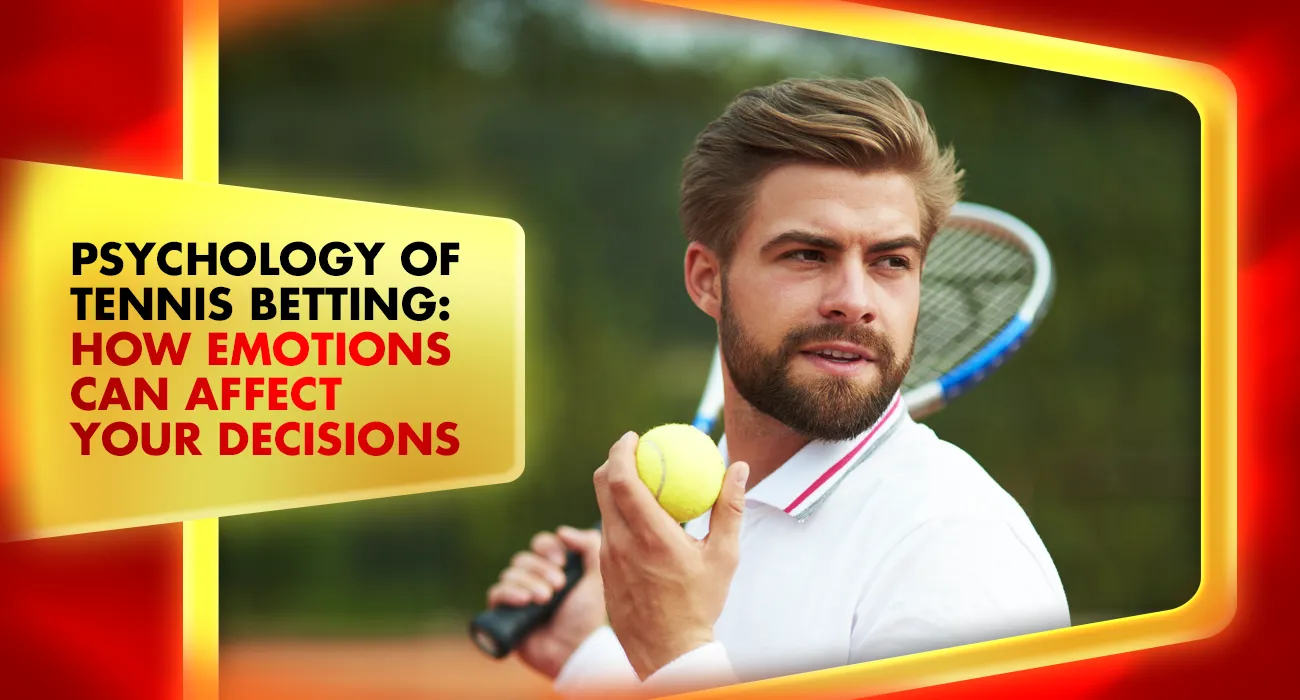Tennis betting is influenced greatly by human psychology as well as odds, statistics, and mathematics. Emotional biases can cloud judgment, leading to impulsive bets, chasing losses, or overestimating specific players.
Understanding the psychological basis of tennis betting will enable you to make more rational and successful decisions, whether you are a beginner or an experienced bettor. We will examine how emotions affect betting behavior in this article and provide useful coping strategies, along with insights on how to maximize your welcome bonus for a better betting experience.
The Role of Emotions in Tennis Betting
The High of Winning
Dopamine, the brain’s “feel-good” neurotransmitter, is released in great amounts after a bet is won. This high can become addictive, leading gamblers to raise their bets without sufficient research. Some players increase their bets in an effort to recreate the thrill instead of celebrating responsibly, which often leads to reckless decisions.
FOMO, fear of missing out
When they are watching an elite tennis competition underway or watching others win substantially, many punters experience FOMO. Without conducting enough research, one might end up betting on every match due to this fear. Such bets fueled by FOMO are often driven by emotion rather than information and usually miss a solid game plan.
Chasing Loss and Loss Aversion
The psychological cost of losing is higher than the cost of winning. Gamblers might impulsively bet more often, often in larger amounts, in a futile effort to salvage losses. Chasing losses is a behavior that can lead to ill-informed decision-making and financial hardship.
Overconfidence Bias
Gamblers might overlook new information or expert opinion following some successful bets because they believe that they possess a “successful system.” Excessive confidence can result in risky bets ignoring important factors such as head-to-head information, ground conditions, and fatigue of players.
The Impact of Favourite Performers
Whether form, match situations, or strength of the opposition, most punters have favorite players and often wager on them. Emotional involvement compromises judgment, leading to biased bets instead of rational ones.
The Effects of Fatigue and Stress
Rational decisions are brought about by wagering while emotionally drained, irritated, or tired. At these times, individuals are in danger of responding irrationally as opposed to meticulously thinking about facts and probability.
How to Master Your Feelings to Bet More Wisely in Tennis
Establish a Concrete Betting Strategy
An organized strategy is the help against emotional gambling. The below must be part of your plan:
- Bankroll Management: Set and stick to a betting budget.
- Predetermined Bet Sizes: Avoid placing large bets after wins or losses.
- Selection Criteria for Bets: Only place bets on games in which you have extensively researched the outcome.
Use a Data-Driven Strategy
Rather than making guesses or relying on emotions, consider the below based on data analytics and the use of AI tools:
- Player shape and level of fitness
- Head-to-head statistics
- The performance of the surface
- Latest match results
Statistics and expert analysis provided by AI are on websites such as Khelraja.com to help you make smart bets.
Do Not Chase Losses in Tennis Betting
All gamblers will have losing runs since losing is part of gambling. Rather than bet again immediately to improve, halt, reflect on what went wrong, and begin anew.
Be in a Clear State of Mind When Tennis Betting
- Avoid betting when you are angry, frustrated, or stressed.
- Place your bets when you’re calm and focused.
- Take a step back before placing any bets if you’re extremely emotional.
Use Self-Control Strategies
- Set Time Limits: Don’t watch games and odds throughout the day.
- Please limit the number of bets by betting on only a few matches instead of all of them.
- Keep a Watch on Your Bets: To recognize mistakes and maximize strategy, maintain a betting journal.
Understand that not Every Bet Will Win in Tennis Betting
The best gamblers lose. Maximize your bet selection and care about long-term profitability instead of sulking over a losing bet. Tennis betting advice may be clouded by emotions, leading to impulsive bets, arrogance, and chasing losses. You can make smarter and winning bets by maintaining a responsible betting plan, adhering to fact-based advice, and keeping emotions under control.
Go to Khelraja.com for the best offers, odds analysis through AI, and expert gambling advice. Bet smart and boost your winnings today!
Also read: Tennis Betting: Analyzing Head-to-Head Stats in 2025





